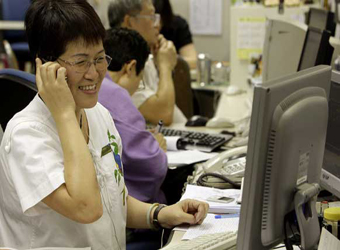Asian shares traded mostly higher on Tuesday with the exception of China and Hong Kong as continued capital outflows from the mainland weighed on sentiment.
Japan’s Nikkei 225 bounced up 0.56 percent after wavering near flat for most of the session. The Bank of Japan (BOJ) announced its decision to hold negative interest rates and 10-year government bond yield target at around zero percent.
As well, the accompanying BOJ statement was also more upbeat on the economic outlook than in November. Investors will now look to BOJ Governor Haruhiko Kuroda’s news conference in mid-afternoon Tokyo time for more indications on Japan’s economic health.
Down under, the ASX 200 closed up 0.52 percent or 29.02 points at 5,591.1.
Earlier, minutes from the Reserve Bank of Australia’s (RBA) December policy meeting showed that it was cautiously optimistic on the economy, despite recent softer data, and was trying to balance the benefits of lower interest rates against the risk of higher household debt.
But one economist said that the RBA’s December minutes are irrelevant.
“The fairly optimistic comments on domestic activity are outdated as we found out the day after the December meeting that GDP fell by 0.5 percent q/q in the third quarter. The minutes confirm that the RBA had expected ‘year-end growth…to decline before picking up,’ but the drop in GDP was larger than the RBA expected,” said Paul Dales, chief Australia and New Zealand economist at Capital Economics, in a December 20 note.
Dales added that the international trade and building approval figures in October, which were released after the RBA’s December meeting, suggest that GDP will not rebound in the fourth quarter.
“The RBA will surely have to sound a bit more cautious when it next meets in early February and will probably revise down its 2017 GDP growth forecast,” Dales said.
In South Korea, the Kospi added 0.29 percent, while Hong Kong’s Hang Seng slipped 0.24 percent.
The Hong Kong benchmark has fallen about 5 percent in the past two weeks.
“The selling was accompanied by emerging market outflow as the U.S. dollar surged to a decade’s high. The fast depreciation of yuan has also urged outflow from the China market, further weighing on Hong Kong equities,” explained Margaret Yang, market analyst at CMC Markets, in a note on Tuesday.
Shares in China fell, with the Shanghai composite down 0.67 percent,and the Shenzhen composite 0.18 percent lower.
The Chinese yuan midpoint was set at 6.9468 on Tuesday versus its last close at 6.9513. The yuan last traded at 6.9506 against the dollar and at a eight-year low.
Investors worry that the capital outflows seen post-Trump’s victory and a weakening yuan could derail an economy that has shown recent signs of stabilization, Reuters reported.
Overnight, major U.S. indexes closed higher in low volume trade. The Dow Jones industrial average closed up 0.2 percent at 19,883.06 and the S&P 500 gained 0.2 percent to 2,262.53, while the Nasdaq composite finished up 0.37 percent at 5,457.44.
In currency markets, the dollar regained some momentum, with the dollar index, which measures the greenback against a basket of currencies, up at 103.21, compared with levels around 102 yesterday.
The stronger greenback weighed on Asian currencies, with Malaysia’s particularly hard-hit.
The dollar was fetching 4.478 ringgit as of 1:17 pm HK/SIN, with the Malaysian currency touching its lowest since January 1998, during the Asian Financial Crisis. The emerging market currency has been whacked by the surging dollar after President-elect Donald Trump’s surprise win, tumbling 11 percent since Nov. 8.
The yen was also weaker against the dollar, with the pair at 117.63 after the BOJ decision, compared with levels as low as 116.95 before the decision, but still below 118 levels seen last week.
The Australian dollar was softer at $0.7251, down from levels above $0.73 on Monday.
The euro was stronger against the dollar at 1.0395, despite overnight news that a truck rammed into a crowded Christmas market in central Berlin on Monday evening, resulting at least 12 deaths and injuring up to 50 others.
The Turkish lira and Russian ruble fell to session lows against the greenback on Monday after the Russian ambassador to Turkey was shot by an off-duty police officer in Ankara. During Tuesday Asian trade, the dollar/lira was at 3.532 by mid Asian afternoon while the dollar/ruble traded at 61.781.
U.S. crude futures were down 0.42 percent at $51.90 a a barrel, while global benchmark Brent slid 0.15 percent at $54.84.
Source: CNBC
